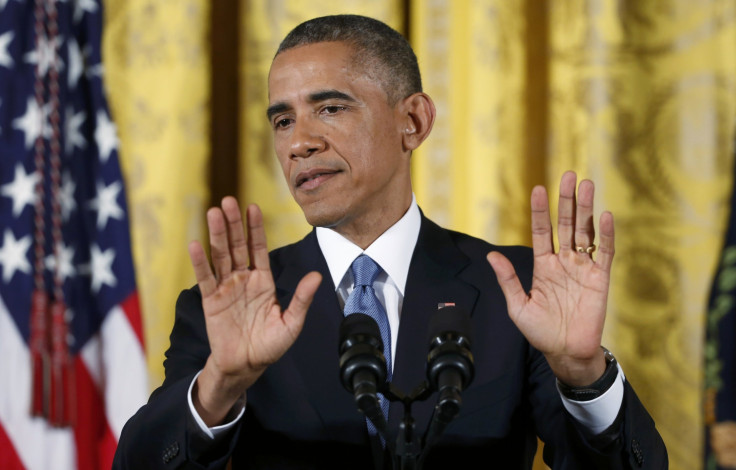Election Results 2014: 5 Democrats To Blame For Midterm Losses

Heads were set to roll and fingers were pointing Wednesday after the Democratic Party tanked in the 2014 midterm elections. Errors in strategy, messaging and spending led to the Democrats' losing seven states and control of Congress. Looking for someone to blame? Here are five suggestions:
1. President Barack Obama
Depending on who you talked to, he either did too much or didn't do enough for Democratic candidates. Voters wanted to punish him for mismanaging the country, The Hill reported, and even though Obama himself wasn't running, he made it clear that his policies were. As a result, candidates like Alison Lundergan Grimes in Kentucky distanced themselves from Obama. In one of Grimes' TV ads, she actually said, "I'm not Barack Obama," and in interview she refused to say if she had voted for him. Meanwhile, exit polls showed two-thirds of voters said they thought the country was on the wrong track. Obama pushed to visit battleground states, Politico reported, but he was denied.
That was a mistake, said Steve Jarding, a Harvard University professor and former Democratic Senatorial Campaign Committee senior adviser. Obama didn't defend himself when critics focused on his failings instead of achievements. Candidates did the same, and it ultimately hurt them. "Democrats were afraid to embrace Obama, and Obama appeared afraid to embrace his own successes," Jarding told International Business Times.
2. Vermont Gov. Peter Shumlin, chairman of the Democratic Governors Association
While Republican Governors Association Chairman Chris Christie pumped millions into New England governor's races, among others, Shumlin simply didn't spend enough. The Associated Press reported the DGA spent $13 million to the RGA's $25 million. In New Hampshire alone, the RGA spent $3 million more than the Democrats. (Democratic Gov. Maggie Hassan survived anyway.) The DGA declined to help Massachusetts attorney general and gubernatorial candidate Martha Coakley because her request came after it had spent $1.3 million in independent expenditures, Mass Live reported. Meanwhile, the RGA shelled out $11 million and ran negative ads against her. (She lost to Republican Charlie Baker.)
Pennsylvania's Tom Wolf was the only Democratic candidate to beat a Republican incumbent. The issue might not have necessarily been a lack of funds, but just that resources were spread too thin trying to defend so many positions, said Spencer Kimball, a political communications scholar at Emerson College in Boston. Shumlin himself failed to win a majority in heavily Democratic Vermont, and the election will be decided by the Legislature.
3. Guy Cecil, executive director of the Democratic Senatorial Campaign Committee, and Senate Majority Leader Harry Reid
Cecil refused to acknowledge poll results that showed support for Democratic candidates slipping in states like Arkansas, Iowa and Colorado, the Washington Post reported. He predicted a path to victory, insisting on margins of error and internal analytics. Cecil called North Carolina, where Democratic Sen. Kay Hagan lost to Republican Thom Tillis, "not a particular area of concern." Cecil's strategy involved bypassing the president and encouraging voters to instead focus on the candidates on the ballot. "For us to nationalize the election in a series of red states would play into the terrain that Republicans want us to play on," he told the Washington Post.
Reid also decided not to be aggressive, Jarding said, and that was a problem. From history, the Democrats should have known they were going into the midterms with several seats at stake. "Democrats played defense in a year when defense wasn't going to win the game," Jarding said. He said Reid's messaging was questionable, too. In an effort to mobilize black voters in North Carolina for Hagan, Reid's super PAC ran ads linking Tillis to the 2012 shooting of Florida teen Trayvon Martin. Reid took heat from critics for politicizing Martin's death.
4. The Southern Democrats
It all goes back to Obama, Kimball told IBTimes. Presidential campaign stops in the South could have energized voters as they did in 2008 and 2012. "He brought out the minority vote both in the Hispanic and African-American communities," Kimball said. "By distancing themselves from the president, they lost this vote." In North Carolina, Hagan received Obama's endorsement, but it was too late to make an impact. She, Grimes, Sen. Mark Pryor in Arkansas and Michelle Nunn in Georgia all lost. Louisiana, where Democrat Sen. Mary Landrieu got 42 percent of the vote, is headed to a runoff election.
Jarding said Southern Democratic candidates failed to challenge Republicans on key issues like food stamp cutbacks and poverty. "If you want to call yourself the party of family values, let's have the debate," Jarding told IBTimes.
5. Kathleen Sebelius, former Health and Human Services Secretary
Sebelius, a former governor of Kansas, wasn't up for election Tuesday, but she still caught some of the blame for botching the rollout of the Affordable Care Act website last year. HealthCare.gov was infamously glitchy, and although 7 million people were able to sign up, word spread about the Obama administration's messy attempt at insuring Americans. Sebelius eventually resigned in April. Republican Senate candidates campaigned on the platform of repealing the health care law, or at least changing it, Business Insider reported. The bad taste from Sebelius' mistakes stayed in voters' mouths all the way through Tuesday.
Messages requesting comment from the Democratic National Committee and Democratic Senatorial Campaign Commitee were not returned Wednesday.
© Copyright IBTimes 2025. All rights reserved.






















